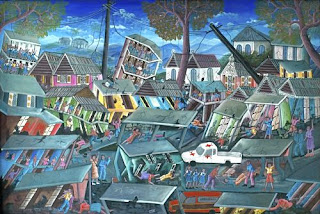 |
| From http://www.provocate.org |
When I was in Port-au-Prince to spend Christmas with my parents last month, my husband and I did our requisite shopping for gifts to bring back to the US. As I strolled around Place Saint Pierre choosing different tableaux and chatting with the artists and vendors (a slower process than usual considering our two toddler boys were also in tow) I was particularly drawn to the pieces of art depicting the earthquake. Some featured bright colors and seemed to capture the atmosphere at exactly 4:53 pm when the earth began to move and shake. Some showed buildings only swaying slightly, you would have to look closely to realize they were off kilter. Others showed houses crumbling over people with blood coming out of them. Still others focused primarily on brightly painted rubble. I decided to purchase one, against my mother’s better judgment. My mom—whose story about how she ran from outside of the house in Musseau to be met by my father telling her that it was an earthquake and pulling them both to cover under the doorpost where they shouted prayers for protection, comfort and in desperation, I know still haunts her—did not think earthquake art would make a very good present. "Why would you get that, it is so sad... " she said. But it is history I thought, sensitive to the incomparable difference in how we experienced the earthquake. She and my father in Port-au-Prince trying to survive, then going out to help those around them while my sisters in me in Boston, like so many in the diaspora, waiting to hear from them, watching news coverage, wondering about their safety.
On the anniversary of the earthquake of all the different stories, emotions and thoughts that come to mind, for Tande I want to focus on what cultural production means or can do for us in the face of catastrophe. One of the most powerful examples of post-earthquake writing is the collection Haiti parmi les vivants made up of testimonies, essays, and poetry by writers who lived through that day. In one of the early pieces Lyonel Trouillot asks, quite appropriately: “Poésie, roman, littérature jeunesse, lyrisme, réalisme, que peut la littérature devant les grands malheurs? Rien. Mais surtout pas se taire…” (54). The role of literature, Trouillot reminds us is to never be silent. The same, I think, can be said of all forms of art. In addition to the huge undertaking of rebuilding that encompasses the fields of development, economic, structural, agricultural, cultural production in the form of literature, music, and visual art has a role to play in the aftermath of the earthquake. Besides being a significant documentation of history and an expression of culture, art is a powerful tool for healing whether it is created by or experienced by people suffering from trauma. From collective music projects like Sak pase Ayiti a veritable konbit of contemporary Haitian musicians, to the tableaux of artists featuring earthquake scenes like the one I decided to purchase, January 12th, 2010 is being re-produced and re-imagined through multiple creative lenses that only enrich an already profound and majestic artistic tradition.
 |
| From http://www.post-gazette.com |
Visual Art
The Repeating Islands has a post here about the traveling art exhibit, “Global Caribbean III: Haiti Kingdom of This World” now showing in Miami that focus on post-earthquake themes. The exhibit features artists such as Edouard Duval-Carrié, and sculptor Guyodo.
Literature
You can visit our reviews section for a post about Haiti parmi les vivants. Danny Laferrière's Tout bouge autour de moi represents his account of the earthquake, Edwidge Danticat's Eight Days is a children's book describing the events, and Ayiti mwen renmen ou! is a collection of poetry published in Canada.
Music
Previously on Tande Nadève wrote a piece about Sak pase Ayiti when they had an event in Port-au-Prince. T-Vice’s album "Welcome to Haiti” takes a different approach to thinking about post earthquake business investments with songs like “Vinn Investi” in which they quote the “we are open for business” line that has been repeated without end since it was first uttered by President Martelly.
Scholarship
Okay so not exactly cultural production, but I could not resist pointing you to two recently published academic texts. Laurent Dubois' Haiti: The Aftershocks of History promises to bring a rigorous historical perspective to the Haitian present and is scrupulously attentive to Haitian intellectual history in doing so. I am also really looking forward to the publication of Tectonic Shifts: Haiti Since the Earthquake which will be out later this month and features essays by Haitian and Haitianist scholars, journalists, activists who have been working on the ground in Haiti on a number of different issues. This book is edited by Mark Schuller a scholar at CUNY whose documentary Poto Mitan is essential viewing for those working on gender and class in Haiti.
This list is meant to be a starting point, at best I urge you to please add to it in your comments!
RMJC